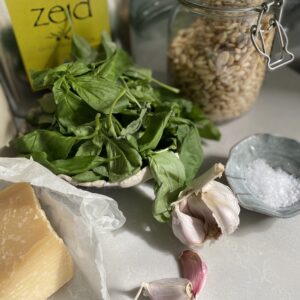pesto

Pesto made from genovese basil is a summertime classic. No need for introductions. The mixture of highly fragrant basil, creamy pine nuts and the salty parmesan evokes summer eating in hot mediterranean countries. Folded into pasta with some starchy water, stirred into a simple risotto, or drizzled onto grilled aubergines, these are useful dishes. A jar of homemade pesto in the fridge is simple to make and tastes miles better than a bought version.
Growing your own basil on a window sill is immensely satisfying, but until then it’s hard to resist the bunches grown elsewhere. Zejd’s extra virgin olive oil lets the basil take centre stage, as its mild flavour doesn’t fight with the fragrance of the basil. We were lucky to have some Lebanese pine nuts preciously stashed in the freezer from our last trip. Much longer and creamier than the Chinese variety, they’re often referred to as “white gold”, with a price to match. Sadly the future of this Lebanese delicacy looks uncertain, as an article in The Independent in 2021 explains.
It takes considerable skill to harvest pine trees. Cones are collected by men who shin up tall pine trees. The pine shoot beetle and the conifer seed bug, reproducing at a great rate, left many cones empty. For those who depend on this as a harvest, they worry that if the trees are not longer productive they will be felled for fire wood. Farmers with no means to plant more, will be forced to let the scrub oak to take over. We hope that Lebanese pine nuts will survive the economic crisis in Lebanon.
keep in the fridge with enough oil to cover the top
ingredients
2 small cloves of garlic
a pinch of sea salt
50g basil leaves
20g pine nuts
100ml Zejd extra virgin olive oil
30g parmesan, finely grated
2 medium sized aubergine, sliced lengthways about 1cm thick
method
- Put the basil leaves, garlic, salt and pine nuts in a food processor and pulse until the leaves are broken down.
- Pour in the oil, gradually, so that the mixture combines. Keep adding until the mixture is loose.
- Finally, fold in the parmesan by hand. If the mixture is too thick, loosen it with some more oil.
- Line an oven tray with some greaseproof paper. Brush the aubergine slices with a little EVOO on both sides, and put them in a hot oven, 190 degrees for 25 minutes until golden and soft.
- Remove from the oven, and while still warm, drizzle over the pesto. Scatter some shavings of parmesan for an extra salty taste if you like.
With any leftover, a spoonful added to a bowl of ribollita is delicious. Transform a plain risotto by stirring 3 tablespoons of pesto into the rice just as it’s cooked, making a wonderfully green plate of comfort food.